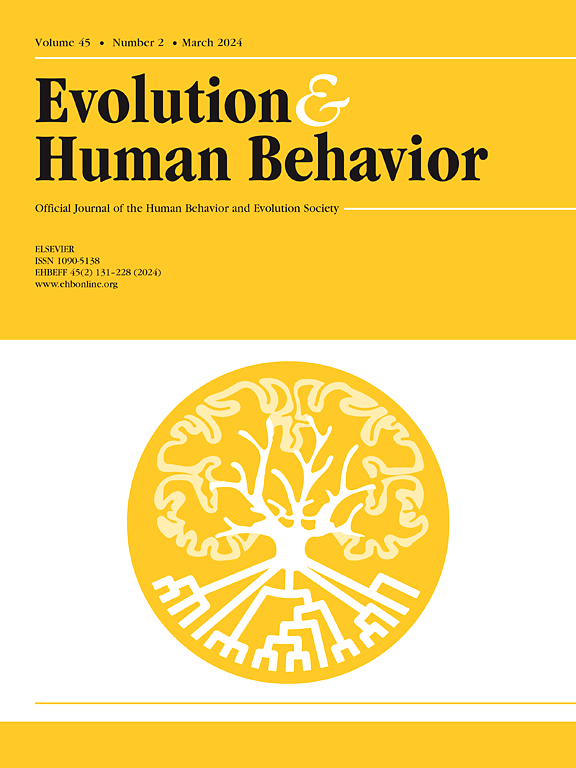The function of love: A signaling-to-alternatives account of the commitment device hypothesis
IF 3.2
1区 心理学
Q1 BEHAVIORAL SCIENCES
引用次数: 0
Abstract
Love is commonly hypothesized to function as an evolved commitment device, disincentivizing the pursuit of romantic alternatives and signaling this motivational shift to a partner. Here, we test this possibility against a novel signaling-to-alternatives account, in which love instead operates by dissuading alternatives from pursuing oneself. Overall, we find stronger support for the latter account. In Studies 1 and 2, we find that partner quality relative to alternatives positively predicts feelings of love, and love fails to mitigate the negative effects of desirable alternatives on relationship satisfaction—contradicting the classic commitment device account. In Study 3, using a longitudinal design, we replicate these effects and find that changes in partner quality relative to alternatives predict changes in love over time. In Study 4, we replicate the relationship between love and relative partner quality across 44 countries. In Study 5, we find a nearly one-to-one correspondence between the extent to which partner-directed actions are diagnostic of love and reductions in romantic alternatives' attraction to the actor. These results suggest that love may not act as a commitment device in the classic sense by disincentivizing the pursuit of alternatives but by disincentivizing alternatives from pursuing oneself.
爱的功能:承诺装置假说的替代信号解释
爱通常被假设为一种进化的承诺装置,抑制对浪漫选择的追求,并将这种动机转变传递给伴侣。在这里,我们用一种新颖的“向替代者发出信号”的说法来检验这种可能性,在这种说法中,爱是通过阻止替代者追求自己而起作用的。总的来说,我们发现后一种说法更有说服力。在研究1和研究2中,我们发现伴侣质量相对于替代方案积极地预测了爱的感觉,而爱并不能减轻理想替代方案对关系满意度的负面影响,这与经典的承诺装置解释相矛盾。在研究3中,使用纵向设计,我们复制了这些影响,并发现伴侣质量相对于替代品的变化预测了爱情随时间的变化。在研究4中,我们在44个国家复制了爱情和伴侣相对质量之间的关系。在研究5中,我们发现伴侣指导的行为对爱情的诊断程度与浪漫选择对演员吸引力的减少之间几乎是一对一的对应关系。这些结果表明,在经典意义上,爱可能不是通过抑制对选择的追求而起到承诺的作用,而是通过抑制对选择的追求而起到承诺的作用。
本文章由计算机程序翻译,如有差异,请以英文原文为准。
求助全文
约1分钟内获得全文
求助全文
来源期刊

Evolution and Human Behavior
生物-行为科学
CiteScore
8.30
自引率
9.80%
发文量
62
审稿时长
82 days
期刊介绍:
Evolution and Human Behavior is an interdisciplinary journal, presenting research reports and theory in which evolutionary perspectives are brought to bear on the study of human behavior. It is primarily a scientific journal, but submissions from scholars in the humanities are also encouraged. Papers reporting on theoretical and empirical work on other species will be welcome if their relevance to the human animal is apparent.
 求助内容:
求助内容: 应助结果提醒方式:
应助结果提醒方式:


